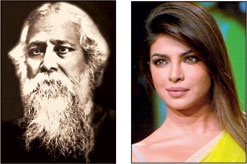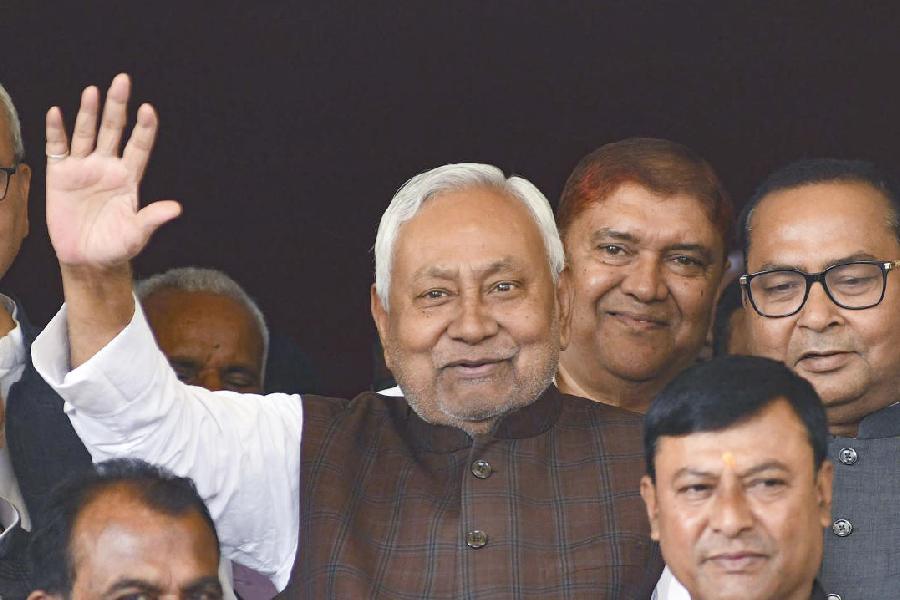New Delhi, March 13: India has slipped a toehold into one of Sri Lanka's strategically most critical port facilities that Colombo had long blocked and that has for more than 50 years been a weathervane on the island nation's leanings between New Delhi and Beijing.

Modi in Colombo on Friday. (AFP)
As Prime Minister Narendra Modi hopped between meetings, lunches and speeches after landing in Colombo today, the two nations agreed to allow Indian Oil Corporation to develop South Asia's largest oil depot at a key port near Trincomalee on the island's northeast.
The public sector IOC will work with the Ceylon Petroleum Corporation to develop the Upper Tank Farm at the abandoned World War II port, ironically known as China Bay, under an agreement Sri Lanka had blocked for several years under former President Mahinda Rajapaksa.
The pact, struck under Rajapaksa's successor Maithripala Sirisena, is a recognition of past strategic opportunities India has missed. It is equally a reminder of the depth of China's relationship with Sri Lanka, often misunderstood as a creation of the Rajapaksa era - Colombo had once considered leasing the China Bay port to Beijing to use during the 1962 India-China war.
'India stands ready to help Trincomalee become a regional petroleum hub,' Modi said in a statement after a meeting with Sirisena and delegation-level talks where Sri Lankan Prime Minister Ranil Wickramasinghe, Indian foreign secretary Subrahmanyam Jaishankar and national security adviser Ajit Doval had joined them. 'The ocean economy is a new frontier that holds enormous promise for both of us. It is a priority for our two countries.'
In Trincomalee, which Modi will not visit, India today sealed what could be the biggest strategic takeaway from the Prime Minister's visit.
The China Bay port stares at the Andaman and Nicobar Islands and at South East Asia, giving those with presence on the port strategic access to one of the region's busiest waterways - especially for trade with China, as its name suggests.
But the port's journey has long mirrored Sri Lanka's relations with the neighbourhood's two giants - India and China.
When India and China were locked in the 1962 war, Sirimavo Bandaranaike, the Prime Minister of the country then called Ceylon, offered to play peacemaker. But her proposals to broker an understanding between India and China were heavily tilted in favour of Beijing, where she was famously called an 'angel of peace'.
 One of her proposals was to let China use the China Bay port as a base - a suggestion she had to discard amid protests from the Opposition United National Party, currently headed by Wickramasinghe.
One of her proposals was to let China use the China Bay port as a base - a suggestion she had to discard amid protests from the Opposition United National Party, currently headed by Wickramasinghe.Four decades later, in the early 2000s, Sri Lanka decided it wanted to modernise the tank farm at the port. India offered assistance and, in 2003, the IOC and the Ceylon Petroleum Corporation signed an agreement.
But Sri Lanka then blocked a subsequent agreement to lease the land to the IOC, which was critical for the public sector major to begin its work, citing a series of concerns through the Rajapaksa years when Colombo edged closer to China again.
For India's strategic community, Sri Lanka has long been a land of missed opportunities - a key reason, officials said, why India had jumped to accept the Sirisena government's signal of a thaw.
When Sri Lanka decided it wanted to develop the Hambantota port at the southern tip of the country, India recognised the strategic gains possible from a role in the project. But mired in bureaucracy, India's offer reached Sri Lanka too late.
Colombo had by then handed the project to China.
Modi landed in Colombo early Friday morning, the first Indian Prime Minister on a bilateral visit to Sri Lanka since Rajiv Gandhi in 1987. The Prime Minister was received at the airport by Wickramasinghe.
After the bilateral diplomatic meetings - where four pacts in all were inked - Modi lunched with the Sri Lankan Prime Minister before addressing the country's Parliament.
The Indian Prime Minister visited the headquarters of the Maha Bodhi Society, a Buddhist group that has for over a century tried to spread Buddhism across South Asia, including India. He also paid homage at a memorial to fallen soldiers of the Indian Peace Keeping Force.
Later in the evening, Modi met leaders of parties in the Opposition, and leaders from the Tamil National Alliance, the country's leading grouping of Tamil parties. The Prime Minister will tomorrow visit Anuradhapura - a sacred Buddhist pilgrimage city - and Jaffna, the capital of the Tamil-dominated Northern Province.
In Talaimannar - the town in the country's northwest that is geographically closest to Rameswaram in India - Modi will launch a rail line built with Indian help.










